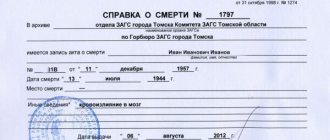Requirements for deregistration of a child
During the procedure for deregistration from the apartment, the following will be taken into account:
- whether the minor citizen owns the residential premises or part thereof;
- whether his legal representatives allow him to do this;
- age;
- approval from the child for discharge (if he has reached the age of ten);
- is there permission from the guardianship authorities;
- living conditions in a new apartment or house (the area per child must be no less than the previous one).
Requirements for discharge of children under fourteen years of age:
- You can only be discharged with one of the parents (if both are registered in the apartment and it doesn’t matter where the child currently lives);
- the application and retirement sheet are drawn up by the legal mother and father, or guardians;
- registration at the new address must be carried out within the time limits established by law.
Requirements for discharge of minors over 14 years of age:
- you can write out and register separately from your parents;
- The teenager fills out the documents independently.
Deregistration of a minor by court
Situations vary. Sometimes you buy housing with a child registered in it, or you yourself once decided to help your family or friends and registered a minor in your living space, but now the parents refuse to voluntarily sign him out.
Such issues are already being resolved through the courts. Yes, the interests of the child are protected by the state, but you, as the owner, also have rights, such as the right to dispose of your property, the right to protection from attacks on property by third parties, and the right to protect property interests.
To deregister a minor through the court, you will need to write a statement of claim and submit it to the court, indicating the child’s parents as defendants. If a minor has reached the age of 14, he has the right to attend the court hearing together with his parents (guardians). To remove a child from registration in court, you must indicate the grounds in the statement of claim, for example, that you are not related to him.
Is it possible to discharge a minor from a privatized apartment if he does not live there?
The current legislation of the Russian Federation regarding housing issues related to children is clearly established. All actions for the discharge and registration of one’s own or someone else’s child at an address (no matter whether the child actually lives there at the moment or not) are controlled by the relevant competent authorities.
To resolve issues with the discharge of a citizen under 14 years of age, you need to rely on:
- Family Code of the Russian Federation – protects the right of children to live with their legal representatives;
- Housing Code of the Russian Federation - provides the right of a minor to register without the consent of the owner of the premises, if one of the parents already lives there. Reflects the standards for the size of living space allocated to a person;
- Civil Code of the Russian Federation (Article 20) – registration of children under 14 years of age is carried out with at least one of the parents;
- The Convention on the Rights of the Child reflects and protects all of its legal possibilities.
The same laws apply to minors 14-18 years old , except Art. 20 of the Civil Code of the Russian Federation “On mandatory registration together with parents.”
Attention! If a privatized apartment is sold, but a new home has not been purchased and, accordingly, there is nowhere to re-register the child, you should open a bank account and deposit a certain amount.
You can read more about whether and how to remove a child from an apartment when it is sold here. The work of registration authorities in relation to children is also regulated by this regulatory framework:
- Art. 292 of the Civil Code of the Russian Federation “On the transfer of rights to real estate...”;
- Art. 558 part 1 of the Civil Code of the Russian Federation “On persons having the right to own residential premises”;
- Art. 288 of the Civil Code of the Russian Federation “Grounds for entering into ownership of real estate”;
- Art. 247 of the Civil Code of the Russian Federation “On shared ownership...”;
- Federal Law of the Russian Federation No. 5242-1 dated June 25, 1993. “On the right of citizens to freedom of movement within the Russian Federation.”
On what grounds can a minor be evicted?
Minor citizens in the Russian Federation are protected to the maximum extent possible by law.
Therefore, any actions that somehow violate their rights are impossible. Discharging a child from an apartment is a procedure that requires compliance with a lot of rules and the collection of a large number of documents.
Is it possible to remove a minor child from the owner’s apartment? Let's try to figure it out.
Dear readers! Our articles talk about typical ways to resolve legal issues, but each case is unique.
If you want to find out how to solve your particular problem, please use the online consultant form on the right or call. It's fast and free!
What the law says
The guarantor of the rights of a minor to housing are the Constitution of the Russian Federation and the Family Code.
According to these documents, a citizen under 18 years of age has the right to live with his parents or legal representatives at their place of registration. In addition, he acquires rights to their real estate.
Legal representatives are required to register the child in their own or municipal housing at the same address where they themselves live. Monitoring compliance with this provision of the Civil Code of the Russian Federation (Article 20) by guardianship and trusteeship authorities.
Article 20. Place of residence of a citizen
- Place of residence is the place where a citizen permanently or primarily resides. A citizen who informs creditors, as well as other persons, about his other place of residence bears the risk of the consequences caused by this.
- The place of residence of minors under fourteen years of age or citizens under guardianship is recognized as the place of residence of their legal representatives - parents, adoptive parents or guardians.
If the father and mother live and are registered at different addresses, then the child is registered at one of these addresses (we talked about whether it is possible to register and discharge a child from the apartment of one of the parents without his consent here). At the same time, the consent of all residents of the apartment where he will be registered is not necessary (Article 70 of the Housing Code of the Russian Federation).
Article 70. The right of the tenant to move other citizens into the residential premises he occupies under a social tenancy agreement as members of his family
- The tenant, with the written consent of his family members, including temporarily absent family members, has the right to move into the residential premises he occupies under a social tenancy agreement his spouse, his children and parents, or with the written consent of his family members, including temporarily absent members of his family, and the lessor - other citizens as members of his family living with him. The landlord may prohibit the move-in of citizens as family members living with the tenant if, after their move-in, the total area of the relevant residential premises per family member is less than the accounting norm. The consent of the other members of the tenant's family and the consent of the landlord are not required to move in with the parents of their minor children.
- Moving into residential premises of citizens as members of the tenant's family entails a change in the relevant social tenancy agreement regarding the need to indicate in this agreement a new member of the tenant's family.
Can the owner remove a child from the owner’s apartment? The law of the Russian Federation reserves the right of a citizen to dispose of his own property at his own discretion.
But in order to complete a transaction for the alienation of real estate, it is necessary to deregister all residents of it. There will be no problems with the removal of adult citizens.
And if a person under 18 years of age is registered in the living space, even if he lives at a different address, he will have to comply with some conditions and take additional measures.
How to discharge a minor child from the owner’s apartment? The owner has the right to discharge a minor without the consent of the guardianship authorities.
But if the court reveals facts of infringement of his rights, he can restore him in registration. Therefore, upon discharge, it is necessary to provide and take into account the following nuances:
- Any actions related to the registration of a minor are carried out jointly with parents (legal representatives).
- The right to sign when drawing up documents for children under the age of 14 belongs to their legal representatives.
- A citizen from 14 to 18 years of age prepares documents independently, but in the presence of parents (or guardians).
- If an adult has both a father and a mother, both must give consent to deregistration.
- If a child is registered in the apartment of relatives, and the parents do not agree with his discharge, the issue is resolved through the court. This takes into account where he actually lives.
- A child under 14 years of age is deregistered only together with one of the parents.
- To deregister, you must have proof that the child will be registered at a different address. Moreover, the conditions at the new place of registration must be no worse than the previous one. For example, you cannot discharge him from a separate apartment to a communal one.
- A separate requirement may be that new housing is located in the same area as the previous one.
We invite you to read: How not to pay bailiffs following a court decision?
The reason for this requirement is that the child, when moving, has the opportunity to attend the same educational institution as before. If this rule cannot be observed, then the permission of the specialists from the guardianship authorities conducting the conversation with the minor is required.
We discussed in more detail the question of whether the owner has the right to expel others from his apartment - former spouses, children - here, and on what basis and under what conditions minors can be expelled, we consider in detail in this material.
Procedure
The procedure for deregistration from residential property involves the following steps:
- Submitting an application for the discharge of a minor to the passport office or the Federal Migration Service. The application must be submitted by one of the parents or jointly. If the child is 14 years old, then he is present during the procedure; if not, the parents act independently. More information about which authorities (passport office or FMS) are currently carrying out the deregistration procedure can be found here.
- Filling out the departure form at the passport office or the Federal Migration Service (form and sample).
- Receive documents in a week.
- Registration of the child at a new address.
To obtain an extract, you must provide the parents’ passports, the child’s passport (after 14 years), the house register, and documents for the apartment.
Extract through court
In the absence of parental consent, discharge can only be carried out through the court. The most common case and reason for appeal is the termination of the rights to use the premises due to actual residence at a different address.
Frequently asked question: how can I remove a child from an apartment without his consent if I am the owner? For example, a child lives in his mother’s apartment, but is registered in his father’s own apartment, the court will most likely discharge him.
If he is registered in a privatized apartment, then this will be more difficult to do, because a minor citizen was registered in the apartment during privatization, and he retains the right to be registered there. You will find more nuances about the owner’s removal of other people, including children, from a privatized apartment in this publication.
The statement of claim requires the presentation of compelling reasons for deregistration. To prove the fact that the child’s place of residence is not at the place of registration, it is necessary to collect witness statements, certificates from the school or kindergarten that he attends.
Some guarantee of receiving a positive decision on discharge may be the presence of acceptable living conditions for the family.
For example, if a child is registered in the apartment of relatives (grandparents, etc.), and the parents with whom he lives are registered at a different address, the court will definitely discharge the child.
The same result will be upon discharge from the father’s apartment, if in fact the child lives with the mother.
However, an obstacle in this case may be the deterioration of living conditions at the new address. Simply put, if it is proven in court that the discharge will lead to a change in conditions for the worse, then the decision will be negative.
There is definitely no need to go to court if the child and his mother do not own housing or have a social tenancy agreement. The court will never discharge him anywhere.
The following documents should be attached to the statement of claim for deregistration of the apartment:
- A certificate from the Housing Office or the Criminal Code stating that these persons do not live in the living space.
- Certificate of property owner.
- Permission from the guardianship authorities to deregister a minor.
If you have permission from the guardianship authorities, you can file a claim in court. The presence of a guardianship representative is also required at the court hearing.
We talk in more detail in this article about whether a new owner can discharge a minor “to nowhere” if he bought an apartment, and how children are discharged when moving.
To obtain permission from the guardianship and trusteeship authorities, you must write an application to the guardianship authorities at your place of residence.
Both parents must apply, unless one of them has been deprived of parental rights. In addition, the presence of a child over 14 years old is mandatory.
In the application, they must name the place of new registration of the child and provide documents for it.
When submitting an application, you must provide the following documents:
- Issue a certificate of persons registered in the living space (extract from the house register).
- Parents' passports.
- Passport or birth certificate of the child.
- A registration certificate or floor plan of the premises where the child will be registered in the future.
We invite you to familiarize yourself with the State duty on labor disputes - the amount and payment procedure
The guardianship authorities check and evaluate the submitted documents and after 2 weeks invite all applicants for an interview.
The interview is conducted with the participation of a USZN inspector. The guardianship authorities issue permission to discharge or prohibit.
The outcome of the case depends on whether the application to various authorities is drawn up correctly. Each of the statements has its own characteristics.
Claim in court
The application to the court is submitted at the actual place of residence of the child.
The claim must first of all be justified, therefore the application must indicate the requirements that comply with current legislation.
First of all, indicate the subject of the claim - recognition of the citizen as having lost the right to use the premises. This is what should be the subject of the lawsuit.
- At the end of the application, ask the court to also recognize the minor as having lost the right to use the premises.
- Discharge from the premises will occur subsequently on the basis of this decision, since the court does not discharge anyone, this will then be dealt with by the relevant authorities.
- Further in the application, indicate the reasons for this decision.
- We talked about how claims for forced deportation are drawn up in various situations in a separate article.
In the Federal Migration Service
Step-by-step instructions for preparing documents
- Apply to the Guardianship Council, if the child has ownership rights to this living space, and submit documentation there:
- certificate “On family composition”;
a paper confirming that the child is the owner;
- birth certificate or passport, upon reaching the age of fourteen;
- original passports of the legal mother, father or guardians.
- Next you need to come in person to:
- Housing department to the passport officer;
- District department of the Federal Migration Service (according to Article 3 of Federal Law No. 5242-1, the main registration functions are assigned specifically to the migration service);
- MFC.
- For the above organizations The following documentation should be prepared:
- written permission from the guardianship authorities;
- an application for the child’s discharge (upon reaching the age of fourteen, the minor writes independently);
- certificate “On family composition”;
- originals and copies of identity cards of guardians or parents, and all citizens living in this apartment;
- birth certificate (up to 14 years of age) or his identity card (after 14 years of age);
- consent of the second parent (if divorced);
- personal account of the apartment;
- technical passport of the premises;
- paper indicating ownership rights;
- contract of sale;
- social tenancy agreement (if any);
- an extract from the house register;
- a copy of the passport of the new living space (if purchased);
- consent of the owner of the residential premises where the child will be registered after discharge;
- a paper containing information about the court decision (if applied).
After considering a specific case with the discharge of a minor, the guardianship authorities will issue a paper with a positive or negative answer . If refused, it will not be possible to deregister a person who has not reached the age of majority.
IMPORTANT! If the parents divorced, and one of the former spouses is against the discharge of the child, or the child is a participant in privatization, or he is the owner of the apartment, then initially you will have to go to court to resolve the problems that have arisen.
The entire procedure for deregistering a minor will take about 24 days:
- receiving a response from the board of trustees will take 2 weeks;
- deregistration upon registration – 3 days from the date of application;
- submission of documentation for registration at a new place of residence - a week after discharge.
De-registration is free of charge.
When applying to the judicial authorities, you will have to pay the state fee established by law at the time of filing the claim.
To confirm departure from the previous place of residence, a special document is issued - a departure sheet and, if you have a passport, a stamp is placed.
More information about the procedure for discharging a child from an apartment can be found here.
Changing the child’s place of residence in the event of parental divorce
As part of the divorce process, the question often arises with whom the child will remain and where he will live. For example, the owner of the living space is the father of the child, by a court decision, the minor will live with his mother. In this case, can a minor citizen become a former member of the owner’s family and be evicted?
In accordance with the Family Code of the Russian Federation, it can. But only if an agreement is concluded between the spouses and approved by the prosecutor’s office, and subsequently the court makes a decision on the child’s place of residence “with a legal guardian who does not own real estate with appropriate living conditions.” Then the minor assumes the status of a former family member and is subject to eviction in a special manner, in accordance with the Housing Code of the Russian Federation,” said the Supreme Court.
If the ex-spouse with whom the child remains, as they say, has nowhere to go, the court may require the owner to provide other family members with real estate. In addition, the state reserves the right to allow a teenager to live in an old apartment for a certain period.
The eviction of minors from residential premises can be permitted only in a judicial manner established by law. After the end of the divorce process, the child does not lose his right to use and dispose of the residential premises (if he owns part of the property). It is possible to resettle a person under eighteen years of age only if the other spouse owns an apartment with more favorable living conditions. The final decision is made by the court in the first or second instance.
The mandatory list of documents includes:
- certificate of ownership;
- an extract from the house register with all additions;
- photocopies of the birth certificate and other documents confirming the relationship between the child and other family members.
If outsiders demand that a minor child be evicted from an apartment, then, as judicial practice shows, you can safely turn to professionals: a law firm or private lawyers. Specialists will help you delay making a decision and protect your child from possible problems. The most common situation is when the owner of the property changes.
There are other typical cases, these include:
- It is prohibited by law to evict a child from a municipal apartment. All the plaintiff’s demands in such situations are considered illegal, since guardianship officials will not give permission to discharge the teenager “to nowhere.” You can file a counterclaim by consulting with a lawyer in advance.
- If the housing has been privatized, the new owner has the right to evict the child. This is especially true in cases where the minor does not have any shares in the property and is not a relative of the owner. In most cases, the state reserves the right to live in the house for three months, or even one year.
- If one of the spouses has alimony obligations, the other may require the provision of other housing with appropriate conditions. It turns out that both the child and the mother acquire free housing at the expense of the second parent.
There are other situations where protection of the legitimate interests of a child is required. However, as practice shows, in our country a special place in the work of social services is occupied by various types of interactions with minors. If OPP employees discover unlawful actions towards schoolchildren or teenagers, the reaction may be ambiguous (either the application is rejected, or the case is re-examined in court).
We invite you to read the Petition to the bailiff
The advantage of such a system is that no decision can be made without the permission of the guardianship authorities.
As already mentioned, the most common situation related to the legal eviction of minors is a change in the owner of the apartment. This causes the termination of the right to use housing for all family members. Even if the child has a residence permit in this building, the new owner has the right to draw up a contract of sale or donation. But in this case it is very difficult to sell a residential property.
However, it is worth remembering that the protection of children is of paramount importance, so the following rules are observed:
- any dispute related to the eviction of minor citizens is resolved only in court;
- ensuring the rights of the child falls within the competence of the guardianship and trusteeship authorities;
- the court does not have the right to make a final decision without familiarizing the person with the composition of the case (upon reaching the age of fourteen).
Today, many different schemes have been developed with which you can legally evict a child from an apartment.
An example is the sale of housing to a “close relative” (after the sale and purchase is concluded, the new owner seeks the eviction of the minor and transfers the rights of use to the seller).
Nuances and features of the procedure in the case of children
- Purchasing a residential property with an area larger than the previous one.
The Board of Trustees will approve such a choice , but only if the value of the child’s share does not decrease. When buying a small home, you will have to register a large part of it, including a smaller number of family members. - Respect for the interests of the minor . Living conditions in new housing should be no worse than previous ones.
- Opening a bank account . If, after the sale of the former apartment, it is not possible to immediately buy a new home, an amount equal to the value of the previously owned share should be deposited into the child’s account.
- Change of educational institution . When purchasing a new home, the family often moves to at least another area of the city. This entails a change of school or kindergarten. For this reason, the board of guardians always asks the child what he thinks about this.
- Illegal discharge . If for some reason it was possible to discharge a minor without the consent of the board of trustees, then in court it is possible to freely restore his registration.
- A child who has reached the age of fourteen can be discharged only at his own request and makes decisions independently .
Important! When a minor is deregistered, the law is always on his side. By observing all the rules and requirements of the current legislation of the Russian Federation, without infringing on the interests of the child, it will still be possible to safely discharge the child.
It will also be useful to familiarize yourself with the following information:
- How can a minor child be discharged from an apartment and what is needed to register him or her in another place?
- How to discharge a minor child from a municipal apartment?
Who should the child live with?
In accordance with Art. 20 of the Civil Code of the Russian Federation, the place of residence of a child who has not reached fourteen years of age is the registration address of his parents or persons replacing them.
For older people, a different registration procedure is provided. Those between 14 and 18 years of age may live separately from their legal representatives, provided that the latter have given their consent. This rule does not apply to those who are unable to take care of themselves, that is, disabled people. They live together with their legal representatives even after reaching fourteen years of age.
Also, the place of registration of the child can be determined by the court after the annulment of the marriage relationship.
When possible
It has already been discussed whether it is possible to deregister a minor citizen at the place of residence. It was about the conditions that would need to be met in order to implement the plan. If the adult does not do this, the children will be registered at the old address.
- It is necessary to confirm with the help of official documents that the child is going to be registered further. This could be a certificate of ownership of a home, a social tenancy agreement.
- You will need to obtain permission from the guardianship and trusteeship authorities. It will be given if the government agency considers that the interests of the minor are not infringed when changing the registration.
- The chosen place of registration is no worse in terms of conditions than the previous one. If it is inferior in terms of amenities, they may not be allowed to change the baby’s address.
Grounds for deregistration
The main reason for discharging a minor child from an apartment or house is, first of all, the relocation of his parents, since the child cannot live separately. The reasons are also determined by the status of housing.
The reasons for discharging a child may be personal, for example, placement in an educational institution or doctor’s recommendations.
From a privatized apartment
If the housing is privatized, that is, it is owned, then eviction occurs after the loss of this right. For example, the apartment was sold to another owner or transferred to the latter by court decision. In this case, the person is obliged to vacate the premises and look for a new place for registration. This will also affect his children, since they can only be registered together with their legal representatives.
There may be cases when a court order can oblige the owner to provide housing for those persons in respect of whom he fulfills the obligation to pay alimony.
From a council apartment
Municipal housing has a special status compared to private housing because it is not owned by a person. The latter in this case is only given the opportunity to live in the premises and use the provided utilities. In this case, the tenant or the owner can initiate the eviction procedure.
Reasons for this may be:
- Judgment. This occurs mainly due to violations of housing and sanitary standards.
- The intentions of the person himself.
- Damage to residential premises, as well as recognition of it as unsafe or unfit for habitation.
Since children cannot live separately from mom and dad, they can also be deregistered on the specified grounds. The exception here is persons aged fourteen to eighteen years. They can remain at the same address only with the consent of their parents or persons in loco parentis.
How can a child be discharged from an apartment?
An application on behalf of children is drawn up according to the same rules described above. A departure sheet is also filled out. Subsequent registration for a new privatized residential area is mandatory, because in any case, the child cannot be left without registration, i.e. going nowhere".
If the parents are divorced or their marriage was not initially registered, then the procedure will not be easy. However, if the father or mother has been deprived of parental rights, is wanted for evading child support, or is listed as missing, then consent to evict the minor child of one of the parents is not required.
Best Lawyers in Moscow
D.E. filed a lawsuit against S.Ch. about reclaiming property from someone else’s illegal possession by eviction without providing residential premises, indicating that on August 2, 1994, she bought from S.A. apartment N in building N on street **. She temporarily lived in the city of Kyzyl, caring for her sick brother and husband. In March 2011, she contacted the Office of the Federal Service for State Registration of Cadastre and Cartography in order to register ownership of the specified apartment, but learned that the apartment was registered in the name of S.Ch. Asked to claim
The claim for eviction, recovery of losses and compensation for moral damage was partially satisfied, since the defendants are not members of the owner’s family, they lost ownership of the apartment on the basis of the transfer of the recovered unsold property to the bank and its subsequent sale, and therefore they are subject to eviction without the provision of other residential premises .
Discharge of a minor child from an apartment by court
And there is nothing selfish in her desire: she does not claim to use the apartment, does not intend to place her child there, and did not even sue for alimony from her ex-husband. But it is clear that both the hospital and the kindergarten in Obninsk are better than on the collective farm where Valentina’s parents live. And if the situation remains the same, the child’s living conditions will worsen significantly. The actions of a father who deliberately cripples the life of his own son are incomprehensible.
The trial to remove the child from registration took place on September 24. Valentina was able to receive a court decision only on October 9. But I couldn’t get a copy of the protocol: in court they don’t provide photocopies, they suggest you come with your own photocopier and make copies yourself. Now Valentina has filed a cassation appeal with the Kaluga Regional Court.
We recommend reading: Can a mother take her child to another city after a divorce?










